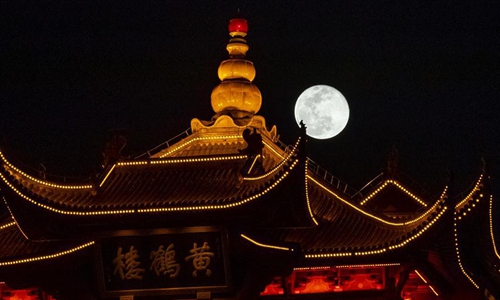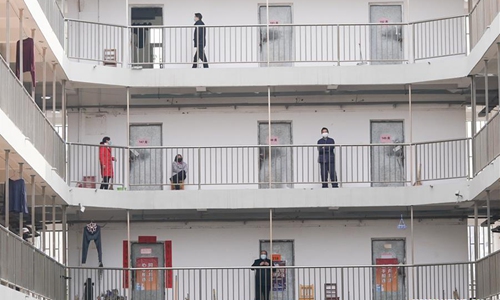HOME >> CHINA
Hubei on path to normalcy
By GT staff reporters Source:Global Times Published: 2020/3/11 22:43:40 Last Updated: 2020/3/11 22:49:36
Local govts weigh lifting restrictions against infection control

The moon rises behind the Yellow Crane Tower, or Huanghelou, a landmark of the city of Wuhan, Central China's Hubei Province, on Tuesday. Photo: Xinhua
Millions of residents in Wuhan and other places of Central China's Hubei Province have spent a prolonged vacation amid a tight city lockdown since the coronavirus outbreak. With visible progress in epidemic prevention and control, such as continuous fall in new confirmed cases, the virus-stricken region is gradually easing restrictions to allow some enterprises to restart operating and local residents to return to normal life.
While Business is expected to pick up in the region, which has been fighting the epidemic at a painful price, local authorities have been urged to come up with more carefully designed policies to ensure economic recovery and prevent a rebound in infections. They are advised to avoid being over-optimistic and or loosing vigilance in the coronavirus battle.
Hubei provincial government on Wednesday allowed businesses to gradually return to normal, categorizing different areas with high, medium and low risks to implement differentiated policies.
In the capital city of Wuhan, some companies, especially those related to epidemic prevention work, daily necessity production and those crucial to the supply chain, could resume work with strict epidemic prevention measures after receiving the approval of authorities. Other companies can't restart work before March 20.
Outside Wuhan, cities and counties in the province, following different categories and arrangements, would allow companies to gradually resume work.
For example, in areas with medium risks, in addition to businesses in essential sectors, firms in agricultural production, construction, software services, legal and accounting sectors could resume, according to the official announcement.
The region, hit hard by the epidemic, is embracing the spring season, which marks a new beginning and recovery. Central and local authorities have come up with flexible approaches to help the society return to normal.
President Xi Jinping's inspection tour to Wuhan on Tuesday injected confidence, sending a message that the coronavirus fight had entered a new phase, observers said.
During his inspection tour, Xi was quoted by Xinhua News Agency as saying that the situation in Hubei and Wuhan has shown positive changes and progress, but the task of prevention and control remains arduous.
Some local residents in Wuhan said they have been told to be prepared to return to work, including applying for a health code through a mobile app that will allow people from medium- and low-risk areas to travel freely, as the region has been under strict lockdown since January 23 and about 56 million under quarantine.
This mobile-based monitoring system aims to facilitate work resumption, as local residents could connect to local social services mini-programs and report personal information and health conditions, or they could also connect to the system through WeChat or Alipay, the apps developed by Chinese internet giants Tencent and Alibaba.
Local resident Laetitia in her 30s, who lives in Wuchang district in Wuhan, told the Global Times that she tried to apply on a government-backed mini-program called Ehuiban, but the code remained grey, indicating it was invalid. She tried on Alipay and was given a green-colored code, which means she has no record of infection or close contact with COVID-19 patients and the code could function as an electronic certificate to go out.
"Although I got a green code, I can't walk out of the residential area I live, as it's still under sealed-off management," she said, noting that it still takes time for the city to return to normal.
However, some residents in Central China's Hubei Province, especially the elderly, are struggling to register with the newly unveiled system which is to categorize individuals amid the outbreak, as they found it's even impossible to log in the system due to overwhelming numbers of applicants.
"Hang in there, we've been staying at home for over 40 days. We should stay cautious and be patient," a 47-year-old resident surnamed Zhu, who lives in Yichang, told the Global Times.
As a Party member working at the frontline since the outbreak, he noted that he has to undertake grass-roots community work and inspections every day.

Photo taken on Tuesday shows the rehabilitation center based in the Wuhan Vocational College of Software and Engineering in Wuhan, central China's Hubei Province. Cured coronavirus patients who had been discharged from hospital were required to go on a 14-day quarantine at designated places for medical observation. Photo: Xinhua
Cautious attitudeIn spite of encouraging signs in epidemic control work, the virus battle in Hubei remains very crucial and local authorities could not ease restrictions and lift lockdowns on a large scale, given the large number of confirmed infections and of close contacts, local officials and observers said.
Xiao Man, who lived in a village in Xiantao city, Hubei said that many villagers are beginning to wander around after being under house quarantine for nearly two months.
"For me, I just sneak out in the evening. For one thing, I am still concerned that the epidemic has not completely receded. Also, those wanderers are being judged by other villagers," he said.
Qianjiang city in the epidemic-hit province, retracted its decision made a day earlier to lift transport restrictions on Wednesday, and local authorities vowed to continue implementing strict traffic and personnel controls to achieve a victory over the deadly virus.
Zhu Lijia, a professor of public management at the Chinese Academy of Governance, told the Global Times that the "farce" shows that the local government is not rigorous and lacks overall thinking.
"The regions of the country are all on the 'same chess board,'" Zhu said, warning that over-optimism and being too relaxed are dangerous, as imported infections and community infections should never be neglected.
Hubei reported 13 new infections Tuesday, all in Wuhan, and 16 other cities and counties recorded zero new cases, the local authority said on Wednesday. 13,712 people are being treated in the province, of which 3,613 are in severe condition and 799 critically ill.
Zheng Shuqian, a Wuhan doctor, said that the once onerous measure has been relaxed a bit in Wuhan.
"But it's not yet time to relax. Residential communities still stick to previous strict quarantine measures," Zheng said.
Posted in: SOCIETY